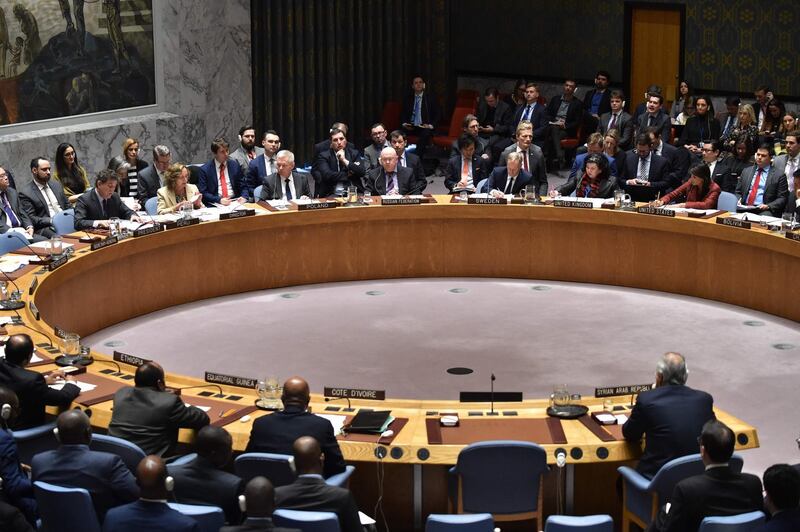Donald Trump has promised a “forceful” response to the nerve gas attack on Saturday in which dozens of people died in the besieged rebel enclave of Douma. Mr Trump says the United States has “lots of options” to strike back at the Syrian armed forces and has cancelled a trip to Latin America because of the crisis.
This is far from the first use of chemical weapons against the Syrian rebels but it comes at a pivotal time. The Assad regime, with the support of Russia and Iran and by using ruthless tactics of bombardment and starvation, is slowly driving away the rebels away from the capital and other strategically important locations.
It is too soon to speak of victory for the Assad regime – it is a long way, even several years, away from controlling the whole territory of Syria. But since the fall of the rebel-held part of the city of Aleppo at the end of 2016, the story of the war has been one of the divided rebel groups suffering one defeat after another.
And even if the end is not nigh, the welcome given by neighbouring countries to Syrian refugees is wearing thin. The 2.5 million Syrian refugees who have made their home in Turkey, sent their children to school there and opened businesses are being given to understand that they should think of returning. Their first stop is likely to be the patch of territory in northern Syria which is controlled by Turkish troops.
Two key questions arise from the latest chemical weapons crisis. The first is, why did the Syrian armed forces use what appear to be banned nerve agents when it looks as if the battle for Douma is almost won? The use of poison gas was bound to enrage Americans and Europeans at a time when the regime’s best option was to hope they turned a blind eye while the remaining rebels were crushed or neutralised.
The answer is simple. The spearhead of the army attack, the so-called Tiger Forces, are so few in number that they cannot afford the losses incurred when advancing into rebel-held towns, even with overwhelming air support. For all their success, they are not strong enough to take charge of the territory they allegedly control.
The second element is that the regime has grown to discount western leaders’ promises of military intervention. In 2013 Barack Obama called off a missile attack on Syria in return for a promise from Vladimir Putin to ensure that all Syria’s chemical weapons were destroyed (a promise not followed through); in 2017, Mr Trump unleashed 59 cruise missiles on a Syrian air base from which a chemical weapons attack was launched but it had no discernible effect on the progress of the war.
With Mr Trump declaring a week ago that US forces would leave Syria soon to let “other people” take care of the situation, Damascus might easily have concluded that US military credibility was shot to bits. All that, of course, presupposes that Bashar Al Assad is actually in control of the military, which is far from proven.
So what action will the US – and perhaps France and Britain – take? The first choice is action to show that the use of chemical weapons will always be met with some retaliation. There is some merit in taking action against the use of chemical weapons – but not all that much. Blasting an airfield with cruise missiles has failed to deter the Syrian regime once already.
The second option is a blow so punishing that it transforms the battlefield. This is beset with dangers as such a strike might kill some Russians, opening the way for an even greater rift between the Washington and the Kremlin, perhaps even a real war. But with most of the battlefronts in Syria calm – except for where the regime is mopping up the rebel remnants – who will benefit from re-escalating the war? The unspoken view among Europeans is that a temporary accommodation with the “monster” in Damascus is the best way to reduce the loss of life in Syria in the hope that future diplomacy can effect a political transition.
There were moments when decisive action in support of the rebels could have changed the course of the war. But all actions have unpredictable reactions: when Mr Obama supplied anti-tank weapons to the rebels, it led to Russia’s entry on the side of the regime. For the prestige of Russia and himself, Vladimir Putin is not going to let Syria fall into the hands of the rebels, however much the Kremlin despairs of Mr Al Assad as a leader.
The history of the past seven years is that Damascus has allies who are steadfast and enemies who are half-hearted or divided among themselves. That seems unlikely to change. After the failure of the United Nations Security Council to reach agreement on Tuesday, some form of military action is inevitable. Russian envoy Vasily Nebenzia pleaded with Americans not to engage in any “illegal military adventure”.
For all his promises of a forceful response, Mr Trump has not abandoned his belief that putting boots on the ground in the Middle East does not win wars. The US has the firepower to wipe out all the ground attack aircraft in Syria’s much-depleted air force. But presumably the fighter-bombers will be hidden away or protected in Russia’s airbase at Khmeimim.
In the end, the response is likely to be more forceful than last year’s but well short of upending the balance for forces on the ground. It will reinforce America’s somewhat ragged credibility, if nothing more.
It is worth recalling what Mr Obama said about US credibility: “Dropping bombs on someone to prove that you’re willing to drop bombs on someone is just about the worst reason to use force.” But that is where we are today.





